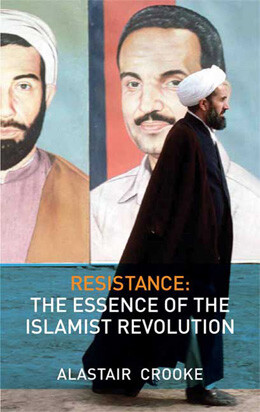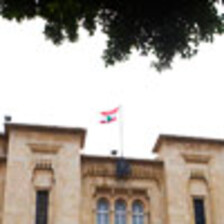The Electronic Intifada 12 December 2009

Crooke, a former advisor to European Union High Representative Javier Solana in the Middle East, admits in the introduction that he is keenly aware of Said’s warnings against speaking of such categories as “Islamism” or the “West” when speaking about a vast array of social, political and ideological phenomena. Crooke agrees with Said that such generalizations are problematic. But then immediately afterwards — in what reads like a sigh of despair — declares that one has little alternative but to go down that road if one is to keep the message simple and focus on defining such an “essence!” The reader might forgive Crooke if this were a brief newspaper article or TV appearance where time constraints and public engagement don’t allow for a nuanced exposition of these ideas. However, this is a nearly 300-page book that itself engages in a multi-layered discussion about ideological trends and philosophies in Islamic and Western thought.
To be fair to Crooke, he does not paint all Islamist movements with the same ideological brush. But he does seem to suggest that they all have one common essence, that of resistance. A more appropriate common thread would have been that of politicization. Political Islam is the sine qua non of this religious revival, with a clear invitation to place Islamic values — both conservative and subversive — at the center of public life. Resistance, on the other hand, is a different matter. It is a feature of certain movements and certain times but not others. It is directed against certain forces, such as imperialism, but not necessarily others, like patriarchy.
The search for an essence undermines what otherwise might have been a worthwhile study of philosophy of resistance among Islamic movements as articulated by influential Islamist thinkers and revolutionaries of the last century. This is a much welcome discussion especially in a European and North American context in which political Islam continues to be highly associated with terrorism and the pre-modern and — as Crooke points out — denied rational agency. Crooke offers numerous engaging discussions about this ideological trend. He explores the common motivating questions that occupied Islamic revivalists like Egyptian Muslim Brotherhood ideologue Sayyid Qutb, the intellectual icon of the Iranian Revolution Ali Shariati, and the figurehead of Islamic thought in Iraq Mohammad Baqir al-Sadr. He also tackles the ideas and beliefs animating political movements like Hizballah and Hamas in their struggle against occupation.
Crooke argues that all of these Islamist ideologies are — in some way or another — a reaction to the Western-inspired and often imposed projects of nation-building, such as Kemal Ataturk’s founding of Turkey along anti-Islamist, secular lines. These nation-building projects, he maintains, tried to uproot local traditions of knowledge and import European understandings of rationality, individualism and morality. Islamist currents critiqued these projects, not because they shunned modernity or rationality, but because they shunned a particular understanding of modernity that suffered from moral decadence, an instrumental use of rationality in the service of power and dominance, and an individualistic depiction of community and social action. In short, Islamists were disillusioned with the perceived spiritual bankruptcy of European 20th century modernity, the latter largely blamed — by Crooke — on its earlier progenitor, the protestant reformation.
It is in the context of this disillusionment that Crooke presents what he terms the “Islamist Revolution,” an attempt to create a “dynamic and forward-looking religion that is in the process of evolving distinct ideas about the individual, about relationship within a society, about relationships between the community and its government.” The conflict then between Islam and the West as envisioned by Crooke is a religious one at its core. It is a clash of two value systems, of two ideological world-views. Sounds familiar? This is Samuel Huntington’s theory of “Clash of Civilizations,” only with inverted conclusions. Huntington clearly ranked the two value systems. He privileged the West as the cradle of modernity, democracy and rationality battling the primitive forces of fundamentalism summarized by Islamist ideology. For Crooke, it is almost the opposite, with Islamism offering a new vision of the essence of man that is more humble, more spiritual and more communal than that of the West.
There may be some — or a lot — of truth to Crooke’s depiction of the value system that many of these Islamist ideologies espouse. Moreover, ideology clearly plays a role in shaping conflicts. But putting too much emphasis on ideology as a source of conflict without linking it to political and economic factors is misleading. Such an emphasis ignores the enduring alliance between secular regimes in the West and the most fundamentalist Islamist ones like Saudi Arabia — a relationship that is based almost entirely on material interests not ideology. Moreover, it underplays the role of the Saudi regime in supporting Islamists across the Arab world and central Asia since the 1970s as a counterweight to secular nationalist and communist movements. This was not a benign interference. It led to significant trends of conservatism and anti-resistance or anti-revolutionary currents in some of these Islamic ideologies that the author does not address. The role of Saudi Arabia aside, the question of the dynamism and transformations of these ideologies over time is not addressed either. For example, Crooke does not explain how this “essential” notion of resistance can be squared with the transition of Islamist forces in Iran from opposition during the Shah’s time to government and at times oppressors of their own people later.
The idealistic and at time lopsided depiction of Islamism and its ethics of resistance, reinforces — ironically in this case perhaps — many of the assumptions that Crooke is trying to dispel. It deprives readers misinformed about political Islam the opportunity to replace their prejudiced and skewed understanding of it with a more nuanced and realistic one. At worst, it belongs to a well-entrenched discourse on both sides of the divide that wants to will away the material realities animating much of these conflicts. At best, it serves as a reminder to us, and hopefully to Crooke, that the road to intellectual misrepresentation can be paved with good intentions.
Hicham Safieddine is a Lebanese Canadian journalist.





